TESCO: Examining Culture, Power, Politics & Motivation in Organisation
VerifiedAdded on 2023/06/09
|8
|2394
|73
Report
AI Summary
This report provides an analysis of organisational behaviour within TESCO, examining the influence of organisational culture, power dynamics, and political interactions on individual and team behaviour. It explores various aspects of organisational culture, including work culture, individual culture, power culture, and function culture. The report also delves into content and process theories of motivation, such as Maslow's hierarchy of needs, Herzberg's motivation-hygiene theory, McClelland's needs theory, and Vroom's expectancy theory, evaluating their application in motivating employees. Furthermore, it critically assesses the relationship between culture, politics, power, and motivation within the organisation, highlighting their impact on organisational performance and profitability. The report concludes by summarizing the key findings and emphasizing the importance of understanding organisational behaviour for achieving organisational stability and success. Desklib provides access to similar solved assignments and study resources for students.
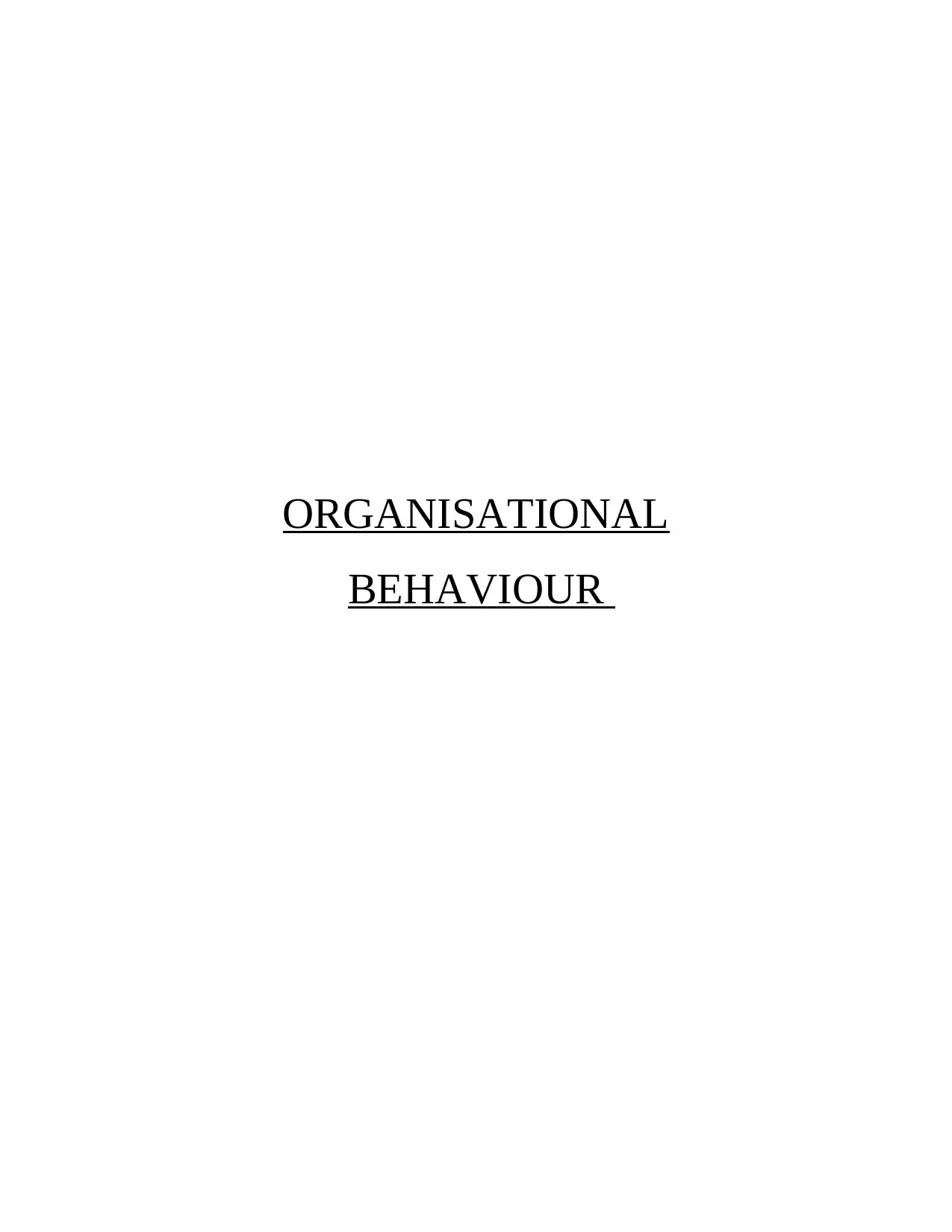
ORGANISATIONAL
BEHAVIOUR
BEHAVIOUR
Paraphrase This Document
Need a fresh take? Get an instant paraphrase of this document with our AI Paraphraser
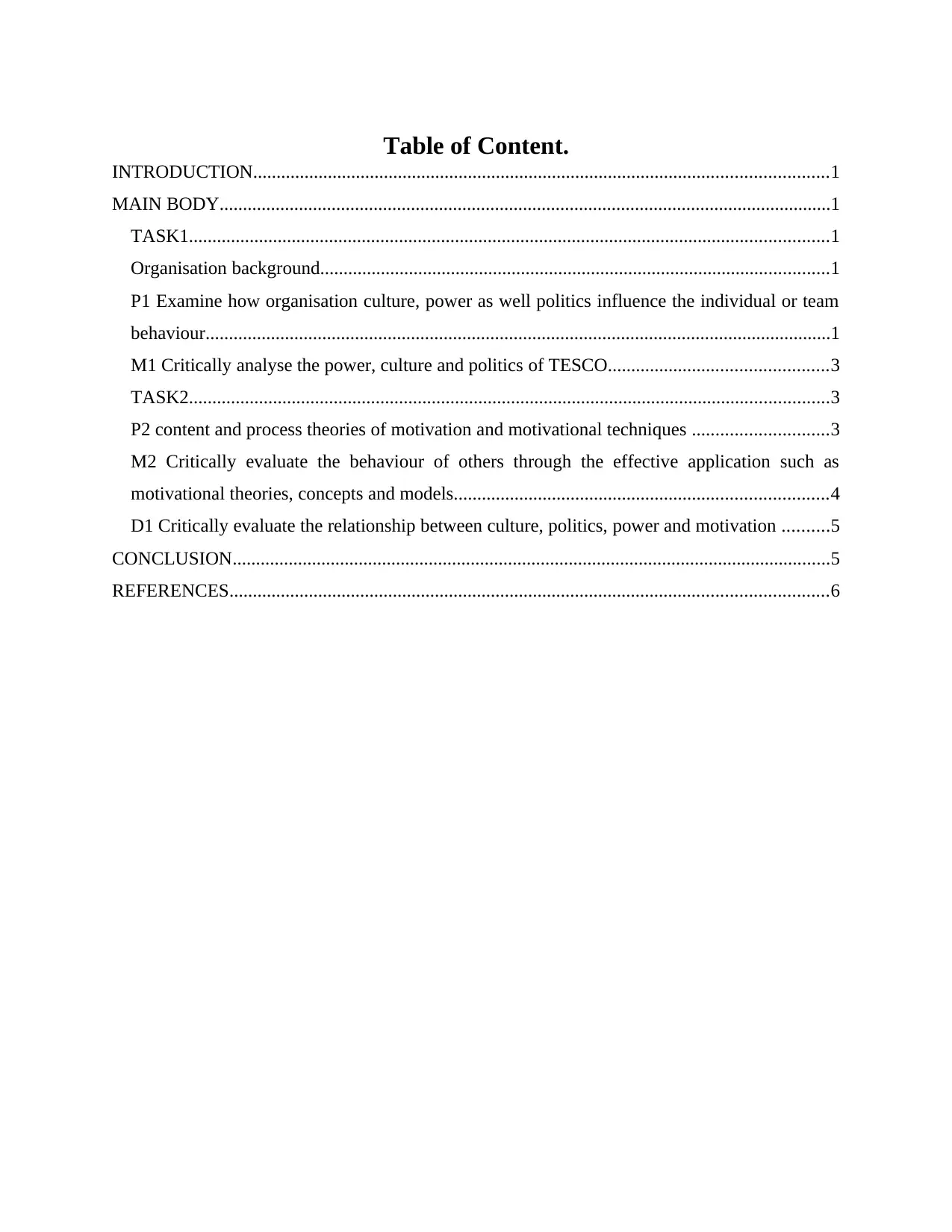
Table of Content.
INTRODUCTION...........................................................................................................................1
MAIN BODY...................................................................................................................................1
TASK1.........................................................................................................................................1
Organisation background.............................................................................................................1
P1 Examine how organisation culture, power as well politics influence the individual or team
behaviour......................................................................................................................................1
M1 Critically analyse the power, culture and politics of TESCO...............................................3
TASK2.........................................................................................................................................3
P2 content and process theories of motivation and motivational techniques .............................3
M2 Critically evaluate the behaviour of others through the effective application such as
motivational theories, concepts and models................................................................................4
D1 Critically evaluate the relationship between culture, politics, power and motivation ..........5
CONCLUSION................................................................................................................................5
REFERENCES................................................................................................................................6
INTRODUCTION...........................................................................................................................1
MAIN BODY...................................................................................................................................1
TASK1.........................................................................................................................................1
Organisation background.............................................................................................................1
P1 Examine how organisation culture, power as well politics influence the individual or team
behaviour......................................................................................................................................1
M1 Critically analyse the power, culture and politics of TESCO...............................................3
TASK2.........................................................................................................................................3
P2 content and process theories of motivation and motivational techniques .............................3
M2 Critically evaluate the behaviour of others through the effective application such as
motivational theories, concepts and models................................................................................4
D1 Critically evaluate the relationship between culture, politics, power and motivation ..........5
CONCLUSION................................................................................................................................5
REFERENCES................................................................................................................................6
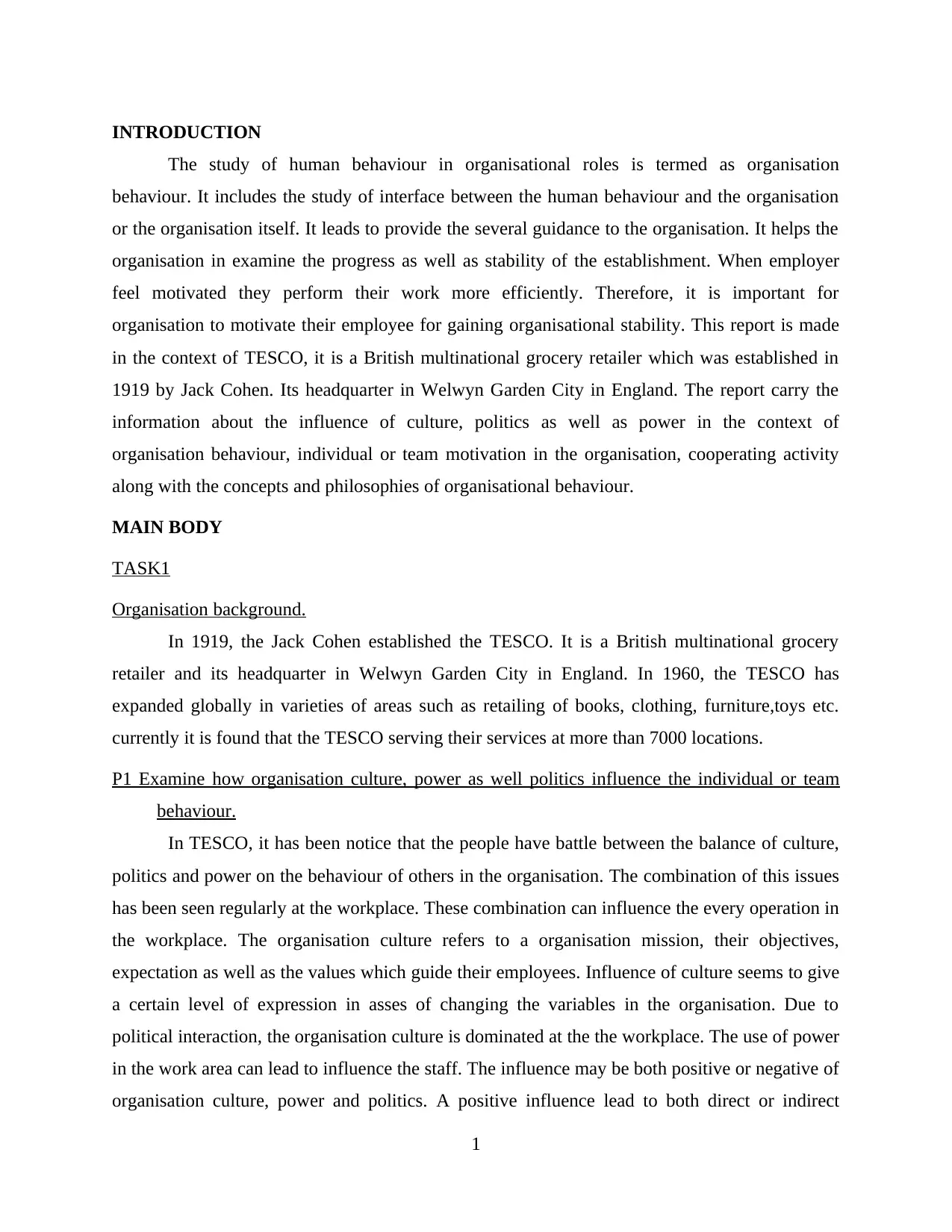
INTRODUCTION
The study of human behaviour in organisational roles is termed as organisation
behaviour. It includes the study of interface between the human behaviour and the organisation
or the organisation itself. It leads to provide the several guidance to the organisation. It helps the
organisation in examine the progress as well as stability of the establishment. When employer
feel motivated they perform their work more efficiently. Therefore, it is important for
organisation to motivate their employee for gaining organisational stability. This report is made
in the context of TESCO, it is a British multinational grocery retailer which was established in
1919 by Jack Cohen. Its headquarter in Welwyn Garden City in England. The report carry the
information about the influence of culture, politics as well as power in the context of
organisation behaviour, individual or team motivation in the organisation, cooperating activity
along with the concepts and philosophies of organisational behaviour.
MAIN BODY
TASK1
Organisation background.
In 1919, the Jack Cohen established the TESCO. It is a British multinational grocery
retailer and its headquarter in Welwyn Garden City in England. In 1960, the TESCO has
expanded globally in varieties of areas such as retailing of books, clothing, furniture,toys etc.
currently it is found that the TESCO serving their services at more than 7000 locations.
P1 Examine how organisation culture, power as well politics influence the individual or team
behaviour.
In TESCO, it has been notice that the people have battle between the balance of culture,
politics and power on the behaviour of others in the organisation. The combination of this issues
has been seen regularly at the workplace. These combination can influence the every operation in
the workplace. The organisation culture refers to a organisation mission, their objectives,
expectation as well as the values which guide their employees. Influence of culture seems to give
a certain level of expression in asses of changing the variables in the organisation. Due to
political interaction, the organisation culture is dominated at the the workplace. The use of power
in the work area can lead to influence the staff. The influence may be both positive or negative of
organisation culture, power and politics. A positive influence lead to both direct or indirect
1
The study of human behaviour in organisational roles is termed as organisation
behaviour. It includes the study of interface between the human behaviour and the organisation
or the organisation itself. It leads to provide the several guidance to the organisation. It helps the
organisation in examine the progress as well as stability of the establishment. When employer
feel motivated they perform their work more efficiently. Therefore, it is important for
organisation to motivate their employee for gaining organisational stability. This report is made
in the context of TESCO, it is a British multinational grocery retailer which was established in
1919 by Jack Cohen. Its headquarter in Welwyn Garden City in England. The report carry the
information about the influence of culture, politics as well as power in the context of
organisation behaviour, individual or team motivation in the organisation, cooperating activity
along with the concepts and philosophies of organisational behaviour.
MAIN BODY
TASK1
Organisation background.
In 1919, the Jack Cohen established the TESCO. It is a British multinational grocery
retailer and its headquarter in Welwyn Garden City in England. In 1960, the TESCO has
expanded globally in varieties of areas such as retailing of books, clothing, furniture,toys etc.
currently it is found that the TESCO serving their services at more than 7000 locations.
P1 Examine how organisation culture, power as well politics influence the individual or team
behaviour.
In TESCO, it has been notice that the people have battle between the balance of culture,
politics and power on the behaviour of others in the organisation. The combination of this issues
has been seen regularly at the workplace. These combination can influence the every operation in
the workplace. The organisation culture refers to a organisation mission, their objectives,
expectation as well as the values which guide their employees. Influence of culture seems to give
a certain level of expression in asses of changing the variables in the organisation. Due to
political interaction, the organisation culture is dominated at the the workplace. The use of power
in the work area can lead to influence the staff. The influence may be both positive or negative of
organisation culture, power and politics. A positive influence lead to both direct or indirect
1
⊘ This is a preview!⊘
Do you want full access?
Subscribe today to unlock all pages.

Trusted by 1+ million students worldwide
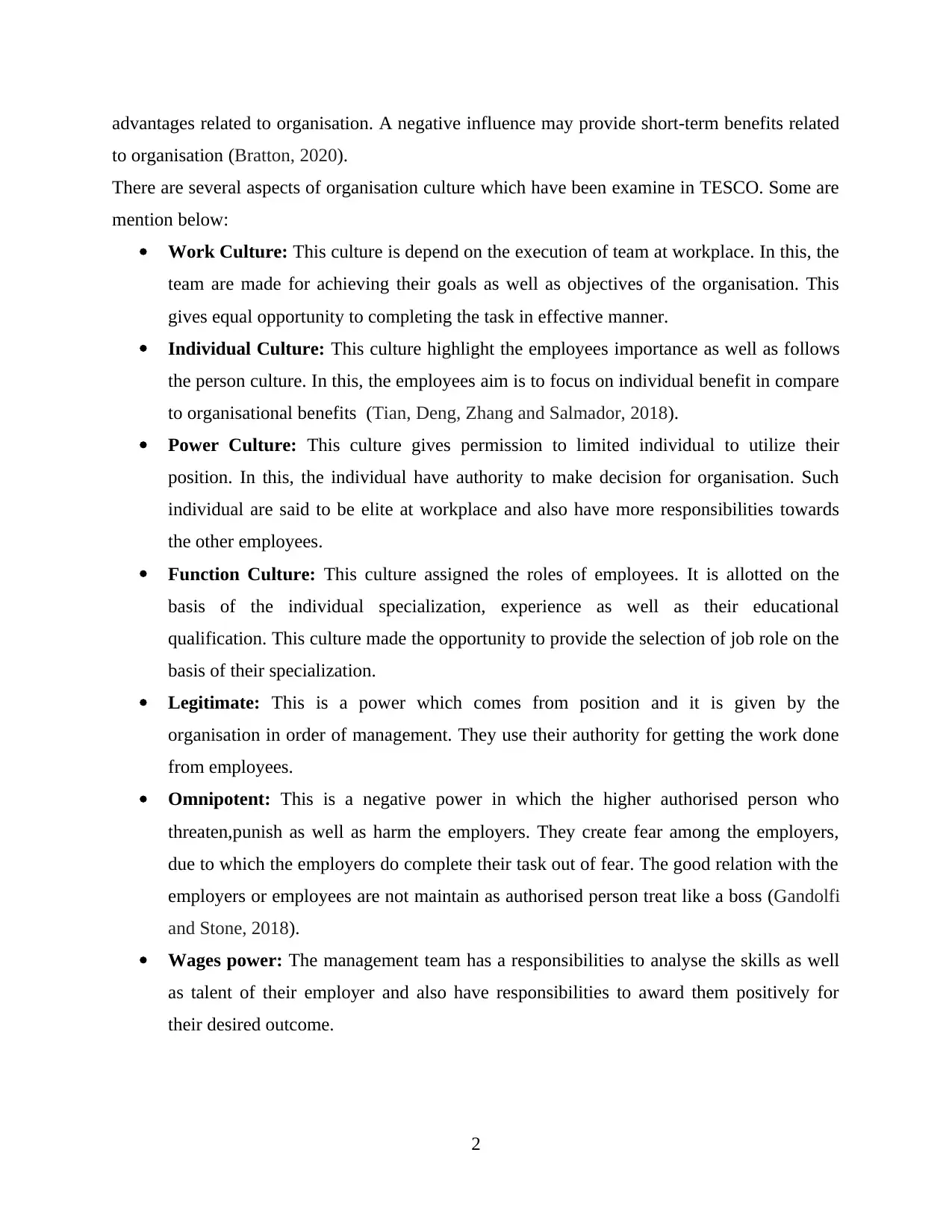
advantages related to organisation. A negative influence may provide short-term benefits related
to organisation (Bratton, 2020).
There are several aspects of organisation culture which have been examine in TESCO. Some are
mention below:
Work Culture: This culture is depend on the execution of team at workplace. In this, the
team are made for achieving their goals as well as objectives of the organisation. This
gives equal opportunity to completing the task in effective manner.
Individual Culture: This culture highlight the employees importance as well as follows
the person culture. In this, the employees aim is to focus on individual benefit in compare
to organisational benefits (Tian, Deng, Zhang and Salmador, 2018).
Power Culture: This culture gives permission to limited individual to utilize their
position. In this, the individual have authority to make decision for organisation. Such
individual are said to be elite at workplace and also have more responsibilities towards
the other employees.
Function Culture: This culture assigned the roles of employees. It is allotted on the
basis of the individual specialization, experience as well as their educational
qualification. This culture made the opportunity to provide the selection of job role on the
basis of their specialization.
Legitimate: This is a power which comes from position and it is given by the
organisation in order of management. They use their authority for getting the work done
from employees.
Omnipotent: This is a negative power in which the higher authorised person who
threaten,punish as well as harm the employers. They create fear among the employers,
due to which the employers do complete their task out of fear. The good relation with the
employers or employees are not maintain as authorised person treat like a boss (Gandolfi
and Stone, 2018).
Wages power: The management team has a responsibilities to analyse the skills as well
as talent of their employer and also have responsibilities to award them positively for
their desired outcome.
2
to organisation (Bratton, 2020).
There are several aspects of organisation culture which have been examine in TESCO. Some are
mention below:
Work Culture: This culture is depend on the execution of team at workplace. In this, the
team are made for achieving their goals as well as objectives of the organisation. This
gives equal opportunity to completing the task in effective manner.
Individual Culture: This culture highlight the employees importance as well as follows
the person culture. In this, the employees aim is to focus on individual benefit in compare
to organisational benefits (Tian, Deng, Zhang and Salmador, 2018).
Power Culture: This culture gives permission to limited individual to utilize their
position. In this, the individual have authority to make decision for organisation. Such
individual are said to be elite at workplace and also have more responsibilities towards
the other employees.
Function Culture: This culture assigned the roles of employees. It is allotted on the
basis of the individual specialization, experience as well as their educational
qualification. This culture made the opportunity to provide the selection of job role on the
basis of their specialization.
Legitimate: This is a power which comes from position and it is given by the
organisation in order of management. They use their authority for getting the work done
from employees.
Omnipotent: This is a negative power in which the higher authorised person who
threaten,punish as well as harm the employers. They create fear among the employers,
due to which the employers do complete their task out of fear. The good relation with the
employers or employees are not maintain as authorised person treat like a boss (Gandolfi
and Stone, 2018).
Wages power: The management team has a responsibilities to analyse the skills as well
as talent of their employer and also have responsibilities to award them positively for
their desired outcome.
2
Paraphrase This Document
Need a fresh take? Get an instant paraphrase of this document with our AI Paraphraser
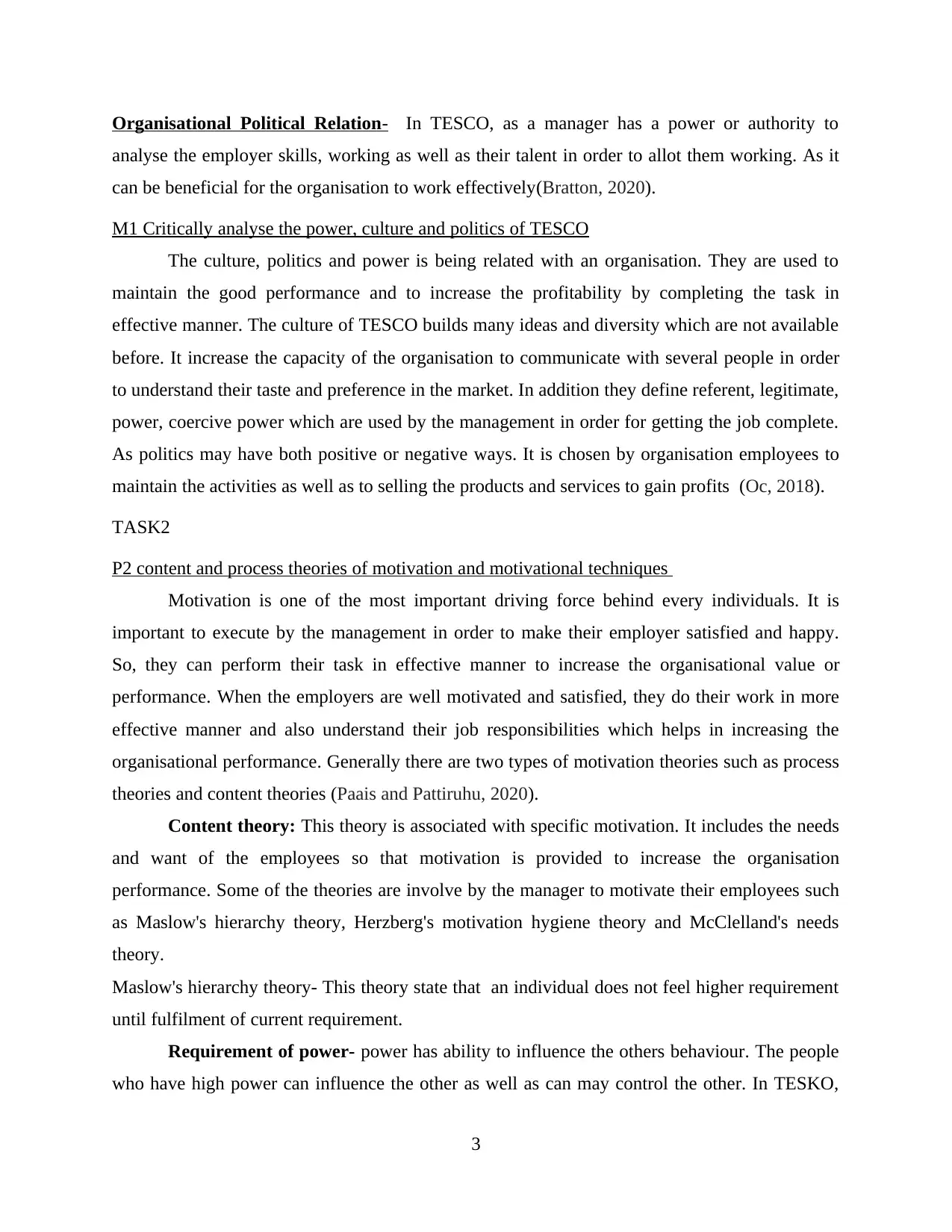
Organisational Political Relation- In TESCO, as a manager has a power or authority to
analyse the employer skills, working as well as their talent in order to allot them working. As it
can be beneficial for the organisation to work effectively(Bratton, 2020).
M1 Critically analyse the power, culture and politics of TESCO
The culture, politics and power is being related with an organisation. They are used to
maintain the good performance and to increase the profitability by completing the task in
effective manner. The culture of TESCO builds many ideas and diversity which are not available
before. It increase the capacity of the organisation to communicate with several people in order
to understand their taste and preference in the market. In addition they define referent, legitimate,
power, coercive power which are used by the management in order for getting the job complete.
As politics may have both positive or negative ways. It is chosen by organisation employees to
maintain the activities as well as to selling the products and services to gain profits (Oc, 2018).
TASK2
P2 content and process theories of motivation and motivational techniques
Motivation is one of the most important driving force behind every individuals. It is
important to execute by the management in order to make their employer satisfied and happy.
So, they can perform their task in effective manner to increase the organisational value or
performance. When the employers are well motivated and satisfied, they do their work in more
effective manner and also understand their job responsibilities which helps in increasing the
organisational performance. Generally there are two types of motivation theories such as process
theories and content theories (Paais and Pattiruhu, 2020).
Content theory: This theory is associated with specific motivation. It includes the needs
and want of the employees so that motivation is provided to increase the organisation
performance. Some of the theories are involve by the manager to motivate their employees such
as Maslow's hierarchy theory, Herzberg's motivation hygiene theory and McClelland's needs
theory.
Maslow's hierarchy theory- This theory state that an individual does not feel higher requirement
until fulfilment of current requirement.
Requirement of power- power has ability to influence the others behaviour. The people
who have high power can influence the other as well as can may control the other. In TESKO,
3
analyse the employer skills, working as well as their talent in order to allot them working. As it
can be beneficial for the organisation to work effectively(Bratton, 2020).
M1 Critically analyse the power, culture and politics of TESCO
The culture, politics and power is being related with an organisation. They are used to
maintain the good performance and to increase the profitability by completing the task in
effective manner. The culture of TESCO builds many ideas and diversity which are not available
before. It increase the capacity of the organisation to communicate with several people in order
to understand their taste and preference in the market. In addition they define referent, legitimate,
power, coercive power which are used by the management in order for getting the job complete.
As politics may have both positive or negative ways. It is chosen by organisation employees to
maintain the activities as well as to selling the products and services to gain profits (Oc, 2018).
TASK2
P2 content and process theories of motivation and motivational techniques
Motivation is one of the most important driving force behind every individuals. It is
important to execute by the management in order to make their employer satisfied and happy.
So, they can perform their task in effective manner to increase the organisational value or
performance. When the employers are well motivated and satisfied, they do their work in more
effective manner and also understand their job responsibilities which helps in increasing the
organisational performance. Generally there are two types of motivation theories such as process
theories and content theories (Paais and Pattiruhu, 2020).
Content theory: This theory is associated with specific motivation. It includes the needs
and want of the employees so that motivation is provided to increase the organisation
performance. Some of the theories are involve by the manager to motivate their employees such
as Maslow's hierarchy theory, Herzberg's motivation hygiene theory and McClelland's needs
theory.
Maslow's hierarchy theory- This theory state that an individual does not feel higher requirement
until fulfilment of current requirement.
Requirement of power- power has ability to influence the others behaviour. The people
who have high power can influence the other as well as can may control the other. In TESKO,
3
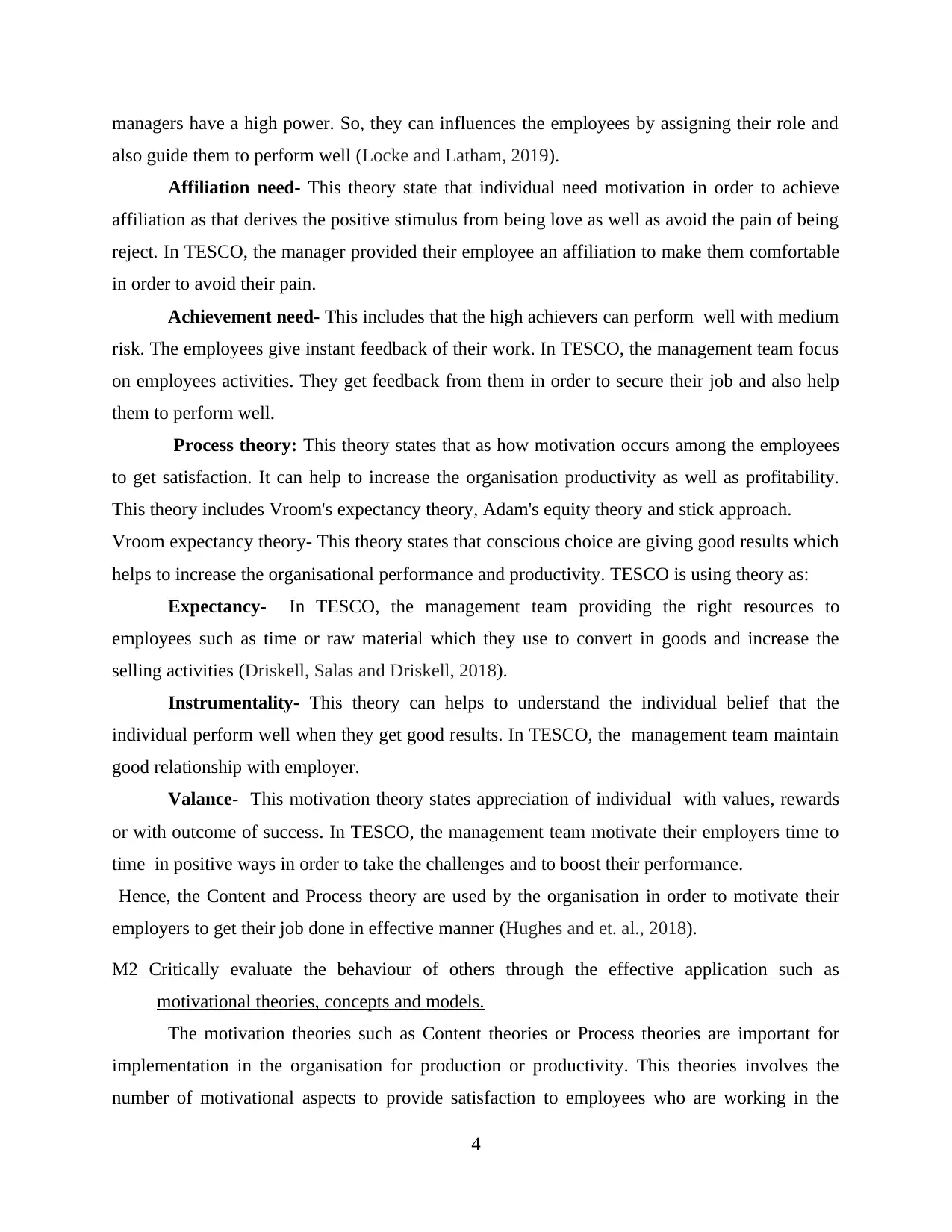
managers have a high power. So, they can influences the employees by assigning their role and
also guide them to perform well (Locke and Latham, 2019).
Affiliation need- This theory state that individual need motivation in order to achieve
affiliation as that derives the positive stimulus from being love as well as avoid the pain of being
reject. In TESCO, the manager provided their employee an affiliation to make them comfortable
in order to avoid their pain.
Achievement need- This includes that the high achievers can perform well with medium
risk. The employees give instant feedback of their work. In TESCO, the management team focus
on employees activities. They get feedback from them in order to secure their job and also help
them to perform well.
Process theory: This theory states that as how motivation occurs among the employees
to get satisfaction. It can help to increase the organisation productivity as well as profitability.
This theory includes Vroom's expectancy theory, Adam's equity theory and stick approach.
Vroom expectancy theory- This theory states that conscious choice are giving good results which
helps to increase the organisational performance and productivity. TESCO is using theory as:
Expectancy- In TESCO, the management team providing the right resources to
employees such as time or raw material which they use to convert in goods and increase the
selling activities (Driskell, Salas and Driskell, 2018).
Instrumentality- This theory can helps to understand the individual belief that the
individual perform well when they get good results. In TESCO, the management team maintain
good relationship with employer.
Valance- This motivation theory states appreciation of individual with values, rewards
or with outcome of success. In TESCO, the management team motivate their employers time to
time in positive ways in order to take the challenges and to boost their performance.
Hence, the Content and Process theory are used by the organisation in order to motivate their
employers to get their job done in effective manner (Hughes and et. al., 2018).
M2 Critically evaluate the behaviour of others through the effective application such as
motivational theories, concepts and models.
The motivation theories such as Content theories or Process theories are important for
implementation in the organisation for production or productivity. This theories involves the
number of motivational aspects to provide satisfaction to employees who are working in the
4
also guide them to perform well (Locke and Latham, 2019).
Affiliation need- This theory state that individual need motivation in order to achieve
affiliation as that derives the positive stimulus from being love as well as avoid the pain of being
reject. In TESCO, the manager provided their employee an affiliation to make them comfortable
in order to avoid their pain.
Achievement need- This includes that the high achievers can perform well with medium
risk. The employees give instant feedback of their work. In TESCO, the management team focus
on employees activities. They get feedback from them in order to secure their job and also help
them to perform well.
Process theory: This theory states that as how motivation occurs among the employees
to get satisfaction. It can help to increase the organisation productivity as well as profitability.
This theory includes Vroom's expectancy theory, Adam's equity theory and stick approach.
Vroom expectancy theory- This theory states that conscious choice are giving good results which
helps to increase the organisational performance and productivity. TESCO is using theory as:
Expectancy- In TESCO, the management team providing the right resources to
employees such as time or raw material which they use to convert in goods and increase the
selling activities (Driskell, Salas and Driskell, 2018).
Instrumentality- This theory can helps to understand the individual belief that the
individual perform well when they get good results. In TESCO, the management team maintain
good relationship with employer.
Valance- This motivation theory states appreciation of individual with values, rewards
or with outcome of success. In TESCO, the management team motivate their employers time to
time in positive ways in order to take the challenges and to boost their performance.
Hence, the Content and Process theory are used by the organisation in order to motivate their
employers to get their job done in effective manner (Hughes and et. al., 2018).
M2 Critically evaluate the behaviour of others through the effective application such as
motivational theories, concepts and models.
The motivation theories such as Content theories or Process theories are important for
implementation in the organisation for production or productivity. This theories involves the
number of motivational aspects to provide satisfaction to employees who are working in the
4
⊘ This is a preview!⊘
Do you want full access?
Subscribe today to unlock all pages.

Trusted by 1+ million students worldwide
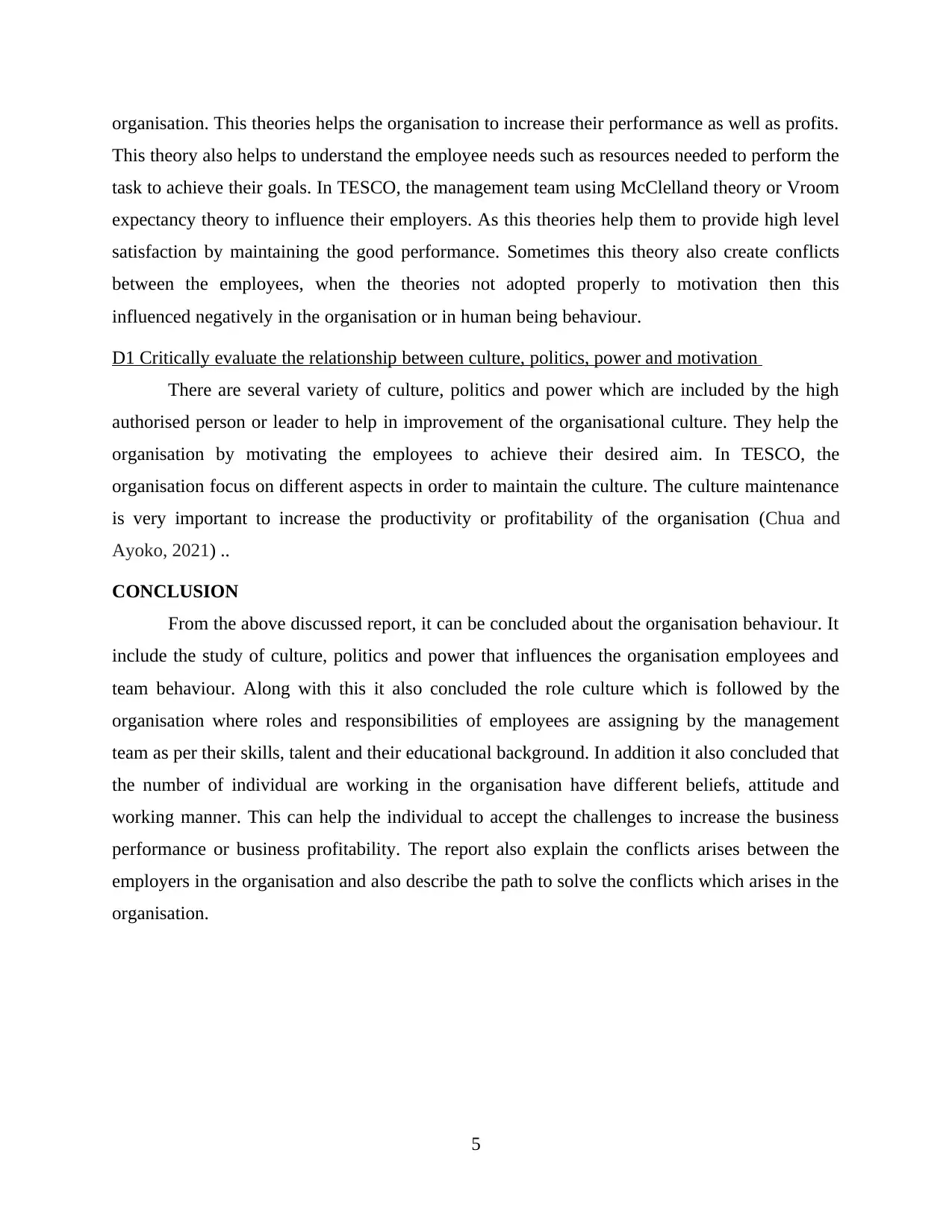
organisation. This theories helps the organisation to increase their performance as well as profits.
This theory also helps to understand the employee needs such as resources needed to perform the
task to achieve their goals. In TESCO, the management team using McClelland theory or Vroom
expectancy theory to influence their employers. As this theories help them to provide high level
satisfaction by maintaining the good performance. Sometimes this theory also create conflicts
between the employees, when the theories not adopted properly to motivation then this
influenced negatively in the organisation or in human being behaviour.
D1 Critically evaluate the relationship between culture, politics, power and motivation
There are several variety of culture, politics and power which are included by the high
authorised person or leader to help in improvement of the organisational culture. They help the
organisation by motivating the employees to achieve their desired aim. In TESCO, the
organisation focus on different aspects in order to maintain the culture. The culture maintenance
is very important to increase the productivity or profitability of the organisation (Chua and
Ayoko, 2021) ..
CONCLUSION
From the above discussed report, it can be concluded about the organisation behaviour. It
include the study of culture, politics and power that influences the organisation employees and
team behaviour. Along with this it also concluded the role culture which is followed by the
organisation where roles and responsibilities of employees are assigning by the management
team as per their skills, talent and their educational background. In addition it also concluded that
the number of individual are working in the organisation have different beliefs, attitude and
working manner. This can help the individual to accept the challenges to increase the business
performance or business profitability. The report also explain the conflicts arises between the
employers in the organisation and also describe the path to solve the conflicts which arises in the
organisation.
5
This theory also helps to understand the employee needs such as resources needed to perform the
task to achieve their goals. In TESCO, the management team using McClelland theory or Vroom
expectancy theory to influence their employers. As this theories help them to provide high level
satisfaction by maintaining the good performance. Sometimes this theory also create conflicts
between the employees, when the theories not adopted properly to motivation then this
influenced negatively in the organisation or in human being behaviour.
D1 Critically evaluate the relationship between culture, politics, power and motivation
There are several variety of culture, politics and power which are included by the high
authorised person or leader to help in improvement of the organisational culture. They help the
organisation by motivating the employees to achieve their desired aim. In TESCO, the
organisation focus on different aspects in order to maintain the culture. The culture maintenance
is very important to increase the productivity or profitability of the organisation (Chua and
Ayoko, 2021) ..
CONCLUSION
From the above discussed report, it can be concluded about the organisation behaviour. It
include the study of culture, politics and power that influences the organisation employees and
team behaviour. Along with this it also concluded the role culture which is followed by the
organisation where roles and responsibilities of employees are assigning by the management
team as per their skills, talent and their educational background. In addition it also concluded that
the number of individual are working in the organisation have different beliefs, attitude and
working manner. This can help the individual to accept the challenges to increase the business
performance or business profitability. The report also explain the conflicts arises between the
employers in the organisation and also describe the path to solve the conflicts which arises in the
organisation.
5
Paraphrase This Document
Need a fresh take? Get an instant paraphrase of this document with our AI Paraphraser
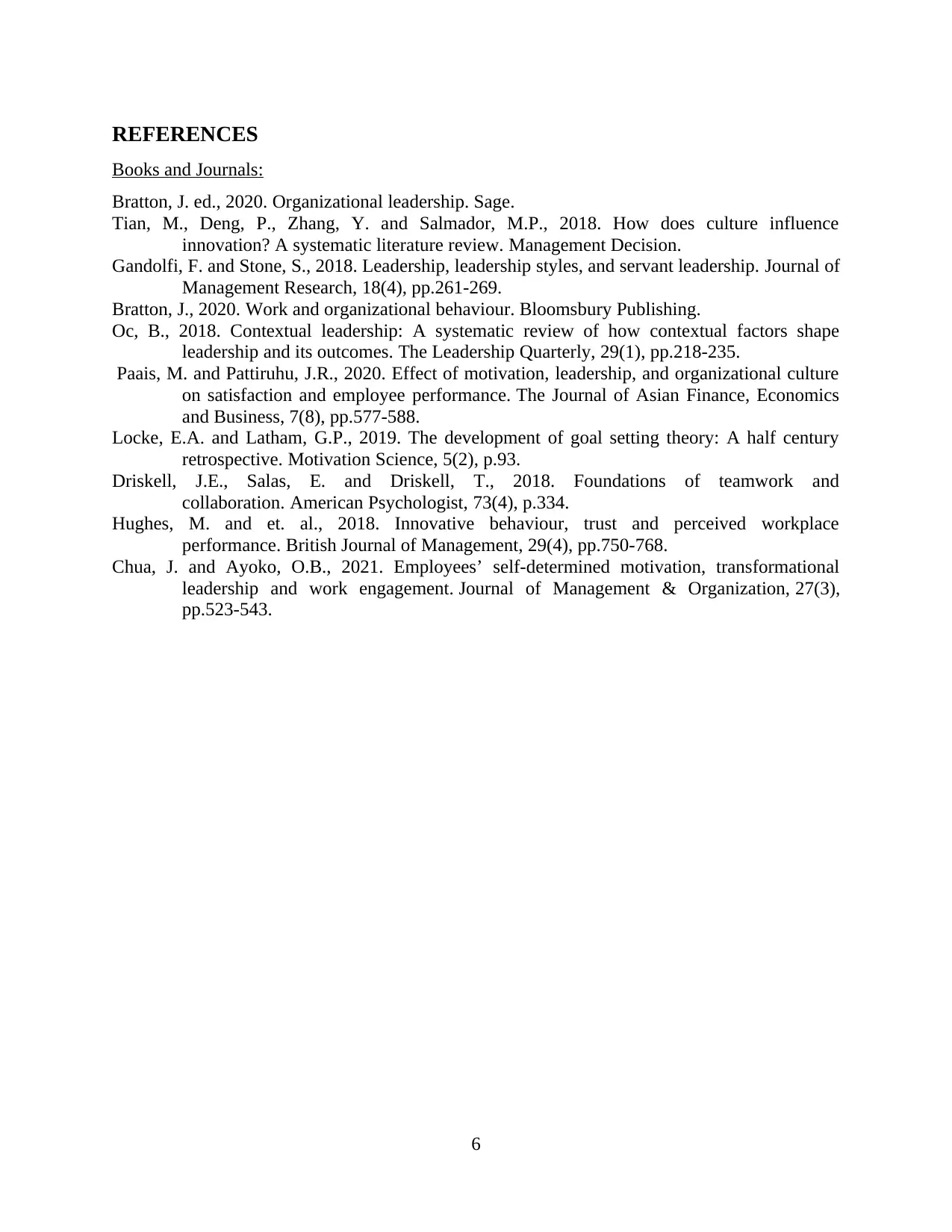
REFERENCES
Books and Journals:
Bratton, J. ed., 2020. Organizational leadership. Sage.
Tian, M., Deng, P., Zhang, Y. and Salmador, M.P., 2018. How does culture influence
innovation? A systematic literature review. Management Decision.
Gandolfi, F. and Stone, S., 2018. Leadership, leadership styles, and servant leadership. Journal of
Management Research, 18(4), pp.261-269.
Bratton, J., 2020. Work and organizational behaviour. Bloomsbury Publishing.
Oc, B., 2018. Contextual leadership: A systematic review of how contextual factors shape
leadership and its outcomes. The Leadership Quarterly, 29(1), pp.218-235.
Paais, M. and Pattiruhu, J.R., 2020. Effect of motivation, leadership, and organizational culture
on satisfaction and employee performance. The Journal of Asian Finance, Economics
and Business, 7(8), pp.577-588.
Locke, E.A. and Latham, G.P., 2019. The development of goal setting theory: A half century
retrospective. Motivation Science, 5(2), p.93.
Driskell, J.E., Salas, E. and Driskell, T., 2018. Foundations of teamwork and
collaboration. American Psychologist, 73(4), p.334.
Hughes, M. and et. al., 2018. Innovative behaviour, trust and perceived workplace
performance. British Journal of Management, 29(4), pp.750-768.
Chua, J. and Ayoko, O.B., 2021. Employees’ self-determined motivation, transformational
leadership and work engagement. Journal of Management & Organization, 27(3),
pp.523-543.
6
Books and Journals:
Bratton, J. ed., 2020. Organizational leadership. Sage.
Tian, M., Deng, P., Zhang, Y. and Salmador, M.P., 2018. How does culture influence
innovation? A systematic literature review. Management Decision.
Gandolfi, F. and Stone, S., 2018. Leadership, leadership styles, and servant leadership. Journal of
Management Research, 18(4), pp.261-269.
Bratton, J., 2020. Work and organizational behaviour. Bloomsbury Publishing.
Oc, B., 2018. Contextual leadership: A systematic review of how contextual factors shape
leadership and its outcomes. The Leadership Quarterly, 29(1), pp.218-235.
Paais, M. and Pattiruhu, J.R., 2020. Effect of motivation, leadership, and organizational culture
on satisfaction and employee performance. The Journal of Asian Finance, Economics
and Business, 7(8), pp.577-588.
Locke, E.A. and Latham, G.P., 2019. The development of goal setting theory: A half century
retrospective. Motivation Science, 5(2), p.93.
Driskell, J.E., Salas, E. and Driskell, T., 2018. Foundations of teamwork and
collaboration. American Psychologist, 73(4), p.334.
Hughes, M. and et. al., 2018. Innovative behaviour, trust and perceived workplace
performance. British Journal of Management, 29(4), pp.750-768.
Chua, J. and Ayoko, O.B., 2021. Employees’ self-determined motivation, transformational
leadership and work engagement. Journal of Management & Organization, 27(3),
pp.523-543.
6
1 out of 8
Related Documents
Your All-in-One AI-Powered Toolkit for Academic Success.
+13062052269
info@desklib.com
Available 24*7 on WhatsApp / Email
![[object Object]](/_next/static/media/star-bottom.7253800d.svg)
Unlock your academic potential
Copyright © 2020–2025 A2Z Services. All Rights Reserved. Developed and managed by ZUCOL.




